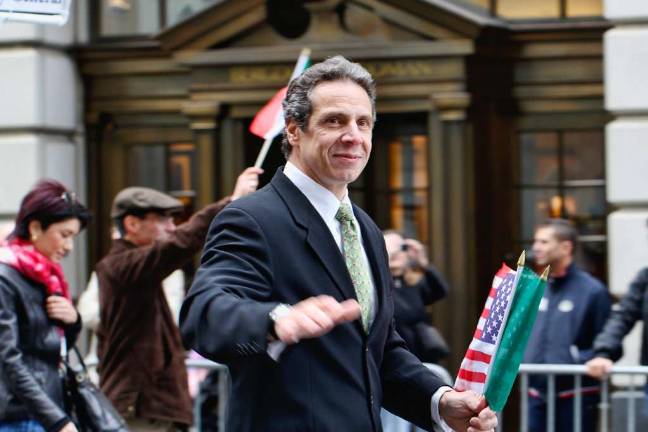Gov. Cuomo Proposes Reduced Penalty for Public Possession of Marijuana

Cuomo seeks to loosen marijuana policies, while some lawmakers call proposal too lenient By Paul Bisceglio Get caught with a joint hidden in your pocket in New York and you get a fine. Get caught with a joint tucked behind your ear or lit in your hand and you get arrested. Concealed possession of 25 grams or less of marijuana is a violation, while possession of the same amount in public view is a misdemeanor. Simple distinction, right? Nope. Consider this: A cop stops you on the street and tells you to empty your pockets, and along with your wallet and keys, out into the open comes the small bag of pot you wanted to smoke at home. Because you followed the cop's orders, and only because you followed the cop's orders, you are now subject to a much more severe punishment than when you were whistling down the sidewalk with Mary Jane ensconced by your side. New York Gov. Andrew Cuomo started a charge last week to erase this "loophole" in law enforcement, as many officials have called it, by proposing a change in state law that would reduce the penalty of visibly possessing 25 grams or less of marijuana in public to a violation with a fine of up to $100 for first-time violators. Cuomo maintained that smoking in public should remain an arrestable misdemeanor, but argued that a reduced penalty for visible weed that's not burning would combat the discriminatory police stop-and-frisk tactics that contributed to the arrest of over 50,000 New Yorkers for possession of small amounts of marijuana last year. "This is an issue that disproportionately affects young people-they wind up with a permanent stain on their record for something that would otherwise be a violation," he said when he announced the proposal. "The charge makes it more difficult for them to find a job. Together, we are making New York fairer and safer and ensuring that every New Yorker has access to a justice system that doesn't discriminate based on age or color." The numbers are telling. Cuomo pointed out that 50 percent of those arrested last year were under 25, and less than 10 percent were ever convicted of a crime. 82 percent were either black or Hispanic. When compared to federal government data on drug use showing that whites use marijuana at higher rates than blacks or Hispanics, the likelihood of police discrimination becomes clear. Supporters see Cuomo's proposal as a necessary continuation of the decriminalization of concealed marijuana in 1977 that will not only protect unlawfully targeted youths from arrests that harm their education, job and housing prospects, but also free up significant police resources to concentrate on graver crimes. "The over 50,000 arrests for low-level marijuana possession last year-one out of every seven arrests in New York City-cost the city and state of New York nearly $75 million in police and court costs," said Manhattan Borough President Scott Stringer, speaking in support of Cuomo's announcement. "The simple and fair change proposed by Governor Cuomo will help us redirect significant resources to the most violent criminals and serious crime problems and, frankly, is the right thing to do," said District Attorney Cyrus R. Vance. Other officials who endorsed Cuomo's proposal include City Council Speaker Christine C. Quinn, New York City Police Commissioner Ray Kelly, New York City Mayor Michael Bloomberg and State Sen. Daniel Squadron. A major coalition of advocacy groups, including Color of Change, Drug Policy Alliance, VOCAL-NY and the Institute for Juvenile Justice Reform and Alternatives launched an online video campaign following the governor's announcement in support of the change. Opposed to the proposal is the State Senate's Republican majority, headed by Dean Skelos, who argued that the change would be excessively lenient. "Being able to just walk around with 10 joints in each ear and only getting a violation, I think that's wrong," he told reporters. He said the proposal would not pass his chamber in its current form. On the police's manipulation of stop-and-frisk tactics to garner arrests, however, Skelos said, "That is wrong. It should be a violation. You're following the policeman's order."